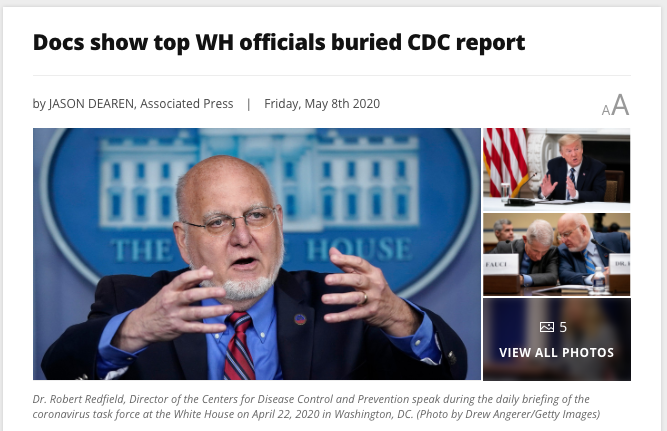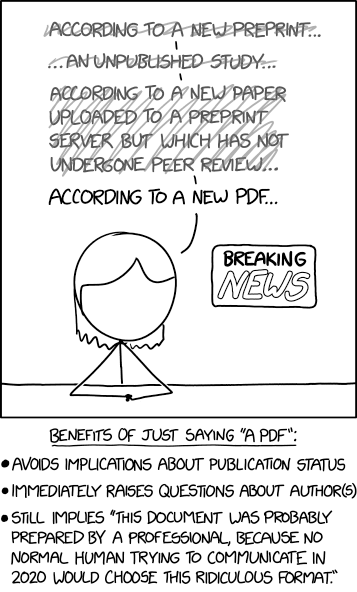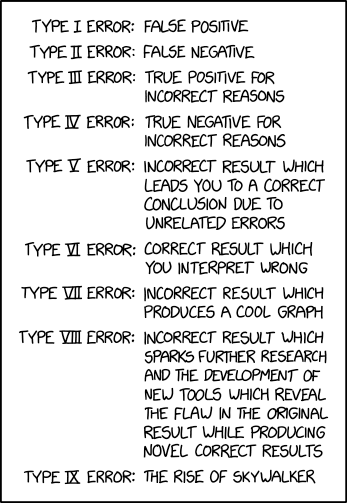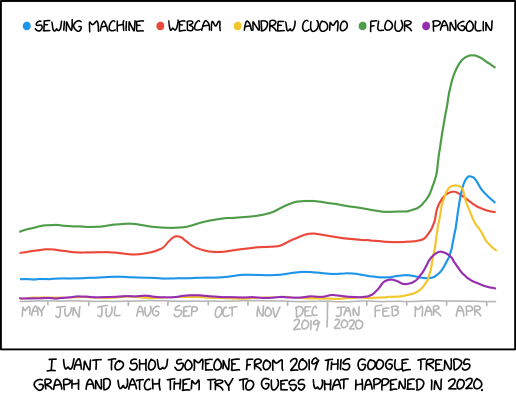Matthew Pottinger's speech in Mandarin
Something extraordinary happened on May 4, 2020. Deputy National Security Advisor Matt Pottinger delivered an extremely impressive speech in virtually flawless Mandarin. Here it is:
Read the rest of this entry »
Garden path of the week
This headline puzzled me:

I interpreted it as
Doctors are showing a buried CDC report to top White House officials
And I wondered, what was that report? and why did the CDC bury it? And who are the doctors digging it up?
What the headline actually meant, of course, was
Documents show that top White House officials buried a CDC report
which makes much more sense in the current environment.
Read the rest of this entry »
"Be careful of the truth"
Two years on, and still my favourite Chinese mistranslation…. pic.twitter.com/0EHeQjybeB
— Antiokhos among the Angles (@AntiokhosE) May 6, 2020
Read the rest of this entry »
Zoom fatigue
There are dozens of articles Out There on "Zoom fatigue", with a wide range of ideas about causes and cures.
Gianpiero Petriglieri offered the BBC a couple of hypotheses about why "Zoom calls drain your energy":
Being on a video call requires more focus than a face-to-face chat, says Petriglieri. Video chats mean we need to work harder to process non-verbal cues like facial expressions, the tone and pitch of the voice, and body language; paying more attention to these consumes a lot of energy. “Our minds are together when our bodies feel we're not. That dissonance, which causes people to have conflicting feelings, is exhausting. You cannot relax into the conversation naturally,” he says.
Silence is another challenge, he adds. “Silence creates a natural rhythm in a real-life conversation. However, when it happens in a video call, you became anxious about the technology.” It also makes people uncomfortable. One 2014 study by German academics showed that delays on phone or conferencing systems shaped our views of people negatively: even delays of 1.2 seconds made people perceive the responder as less friendly or focused.
Read the rest of this entry »
European slaves in the year 1000
Valerie Hansen has a new book just out:
THE YEAR 1000: When Explorers Connected the World — and Globalization Began. New York: Scribner, 2020.
A NYT review of Hansen's landmark volume is copied below, but let's first look at some interesting language notes concerning the background of the word for "slave" (Chapter 4 is on "European Slaves"; the quotations here are from pp. 85-86).
The demand for slaves [in addition to that for furs] was also high, especially in the two biggest cities in Europe and the Middle East at the time–Constantinople, the capital of the Byzantine empire, and Baghdad, the capital of the Abbasid caliphate, in present-day Iraq. The residents of Constantinople and Baghdad used their wealth to purchase slaves, almost always people captured in raids on neighboring societies.
Read the rest of this entry »
Perils of topic modeling
Today's xkcd illustrates why topic modeling can be tricky, for people as well as for machines:
The mouseover title: "As the 'exotic animals in homemade aprons hosting baking shows' YouTube craze reached its peak in March 2020, Andrew Cuomo announced he was replacing the Statue of Liberty with a bronze pangolin in a chef's hat."
Read the rest of this entry »
"This laptop is loaded to bear"
Ewan Spence, "Apple Leak Reveals Radical New MacBook Pro", Forbes 5/4/2020:
Apple may finally be getting round to updating the 13-inch MacBook Pro with Intel’s tenth generation processors. The good news is that the MacOS powered laptop going to get a bucketload of extra power.[…]
This laptop is loaded to bear in terms of memory and storage as well. The current 13-inch MacBook Pro can be upgraded to 16 GB of RAM and 2 TB of storage, so we’re looking at a doubling of the core specs.
Read the rest of this entry »
The sound and sense of Tocharian
Readers of Language Log will certainly be aware of Tocharian, but when I began my international research project on the Tarim Basin mummies in 1991, very few people — only a tiny handful of esoteric researchers — had ever heard of the Tocharians and their language since they went extinct more than a millennium ago, until fragmentary manuscripts were discovered in the early part of the 20th century and were deciphered by Sieg und Siegling (I always love the sound of their surnames linked together by "und"), two German Indologists / philologists — Emil Sieg (1866-1951) and Wilhelm Siegling (1880-1946), in the first decade of the last century.
Read the rest of this entry »
Metathesis in action
At the end of the May 1 episode of the NPR show "Milk Street", host Christopher Kimball interviews Dr. Aaron Carroll about a recent California court decision that could force coffee to come with a label warning that it contains a chemical known to cause cancer.
The chemical in question is acrylamide, and it's apparently created (in small quantities) whenever carbohydrates are heated above about 250 degrees farenheit — so bread, crackers, cake, cookies, pizza, pretzels, fried potatoes, corn chips, and lots of other things besides coffee that most people eat regularly. Dr. Carroll argues that the quantities of acrylamide involved are far too small to pose any measurable danger, and that warnings like this one have the bad effect of persuading people to ignore all such messages.
But this is Language Log, not Cancer Warning Over-Reach Log, so what's the linguistic point? It's the way that Dr. Carroll pronounces the name of the chemical in question.
Read the rest of this entry »


